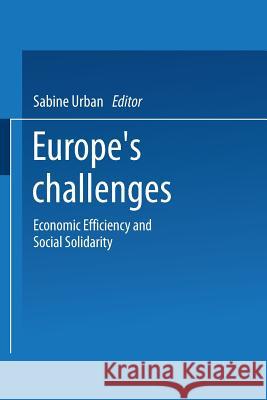Europe's Challenges: Economic Efficiency and Social Solidarity » książka
Europe's Challenges: Economic Efficiency and Social Solidarity
ISBN-13: 9783409132466 / Angielski / Miękka / 1996 / 461 str.
The current work is the third volume in the se ries "Europe's Economic Future," edited by Strasbourg's Robert Schuman University, under the direction of Professor Sabine Urban, head of the CESAG-IECS research center. This series intends to analyze the European situation -not through idealized models of operation or abstract schemas - rather based on concrete observations, equally elose to the actions and the life of the European citizen as of Europe's corporations and institutions. The studies that are presented here are not, however, simply descriptions; they refer to precise conceptual frameworks and nourish a long-term reflection. This volume, like its predecessors, reflects the diversity which characterizes Europe, rich and stimulating but, at the same time, difficult to manage. Spectacular advances are followed by moments of hesitation. With European construction, new processes of adaptation and new competitive strategies must be implemented by businesses. Public authorities must respect the convergence constraints imposed by the European Union (Maastricht I) and imagine a modified institutional framework for the European Intergovernmental Conference of 1996 (Maastricht II). The citizens of the fifteen countries involved need themselves to be enlightened about the future, to understand how - between independent markets and coordinated policies - a desirable economic and social cohesion in the European area will be realized. Furthermore, the area itself is not fixed; it is evolving between the strengthening of links and the opening of new horizons.











